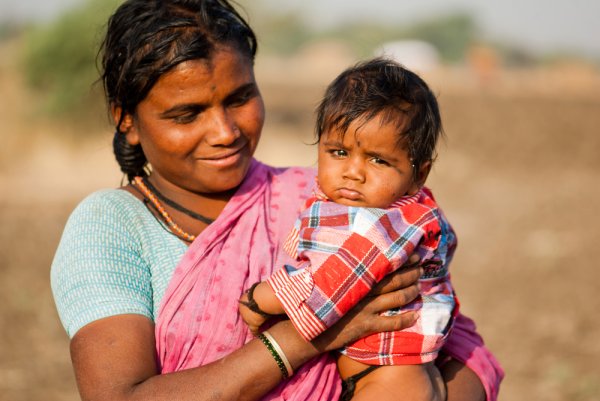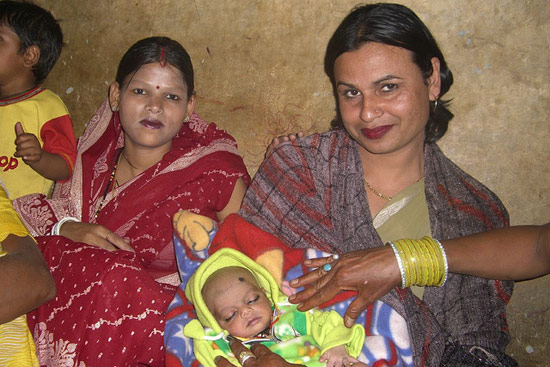Life Stages: Birth
Cultural Views
A deeply religious country as a whole, India provides a home to big believers in fate and astrology, regardless of the particular religion they follow. The Hindu-Buddhist-Jainist worldview regards present birth as one among the innumerable births one has to undergo before escaping from the cycle of rebirth by attaining Moksha (liberation) or Nirvana (extinction). All over India, the birth of a child occasions joy and celebration. Families welcome the newborn into the world with sacred rites, singing, and the distribution of sweets and gifts. The child’s genealogy and horoscope are cast immediately after he is born.
Indians observe the rituals surrounding the birth of a child even when the baby is in the womb. During the Valaikappu ceremony (called godhbarai in the North and performed during the odd months of pregnancy, especially the seventh month), the mother-to-be wears a lot of bangles (valai) and Indians pray for the welfare of the woman and the fetus. The mother removes the bangles during delivery and presents them to the midwife (or nurse) when the baby is born.
India’s healthcare system provides adequate care in the urban areas, and obstetricians and skilled attendants help to deliver the baby. In the teeming villages of India, however, many women give birth at home with the assistance of semi-skilled midwives. An increasing number of villages have primary health centers available for expectant mothers. While women in urban areas and among the middle/upper classes in rural areas invariably prefer doctors, many poor women in remote villages have access to midwives only to deliver their babies. According to an early 21st century survey, around two-thirds of mothers below the age of 20 received prenatal care from a skilled healthcare worker, while above 40 percent of them received assistance during delivery from a skilled attendant.
Religious Rituals
Many Hindus, especially Brahmins, consider the mother impure after delivery and perform purification rituals that may last up to 30 days.
After childbirth, Muslims speak the Azaan (Islamic call to prayer) in the baby’s right year and the Iqamat (second call to Islamic prayer) in the left ear. The Sikhs recite Japji Sahib or verses from the "morning prayer" into the ears of the newborn. In the Jain ritual of Priyodhbhav Sanskar, mothers must observe 10 days of cleansing (Sutak) after the delivery, during which time no other religious rituals (including going to the temple) are performed, while the priest chants mantras in the temple for the welfare of the child. Christians baptize their children some time after birth, at which time the child receives its Christian name.
The other ceremonies after childbirth are namkaran or naming of the child (Hindu, Jain), annaprasana or "first feeding of rice" (Hindu), and sunnat or circumcision (Muslims).
Most Indians across the whole religious spectrum value and celebrate birthdays in some way. The ritual of annaprasana takes place on the first birthday when the baby is given its first solid food. Devout Hindus, Buddhists, Jains, and Sikhs usually go to the temple for prayer and thanksgiving on their birthdays. Muslims and Christians also go to their churches or mosques on that day.
In order to deal with its burgeoning population, the Indian government passed the Medical Termination of Pregnancy (MTP) Act in 1972, making abortions available practically on request. The MTP stipulates that abortions should be conducted in approved institutions, but only 15 percent of all abortions take place in such institutions. A staggering 11 million illegal abortions are performed every year in India, according to an early 21st century estimate. Tragically, many perform abortions in order to terminate female fetuses.
Copyright © 1993—2025 World Trade Press. All rights reserved.

 India
India 
